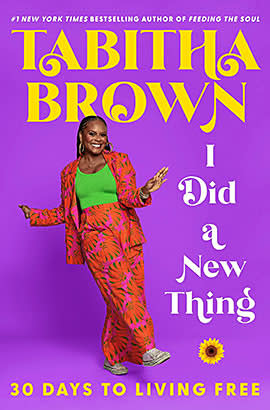Tabitha Brown Opens Up About Embracing Change, Her Tearful 'Freedom Walk' and Lessons From Her Sweet Mama (EXCLUSIVE)
Doing something new can often be intimidating, and many women resist the challenge, but not Tabitha Brown. She’s built a happy life and successful career through embracing change. In her new book, I Did a New Thing: 30 Days to Living Free, Tabitha encourages other women to find freedom by changing their routine.

Alberto E. Rodriguez/Getty for Hollywood Confidential
“Sometimes we can be such creatures of habit that we do a routine every single day and we start to not feel well," Tabitha told Woman's World when we sat down with her for an exclusive interview for our special Mother's Day issue. "We start to feel a little depressed sometimes because we haven’t done anything new, and things have just gotten old. We need something exciting for our mindset and to open our brain up to something else. Our eyes need to see something new.”
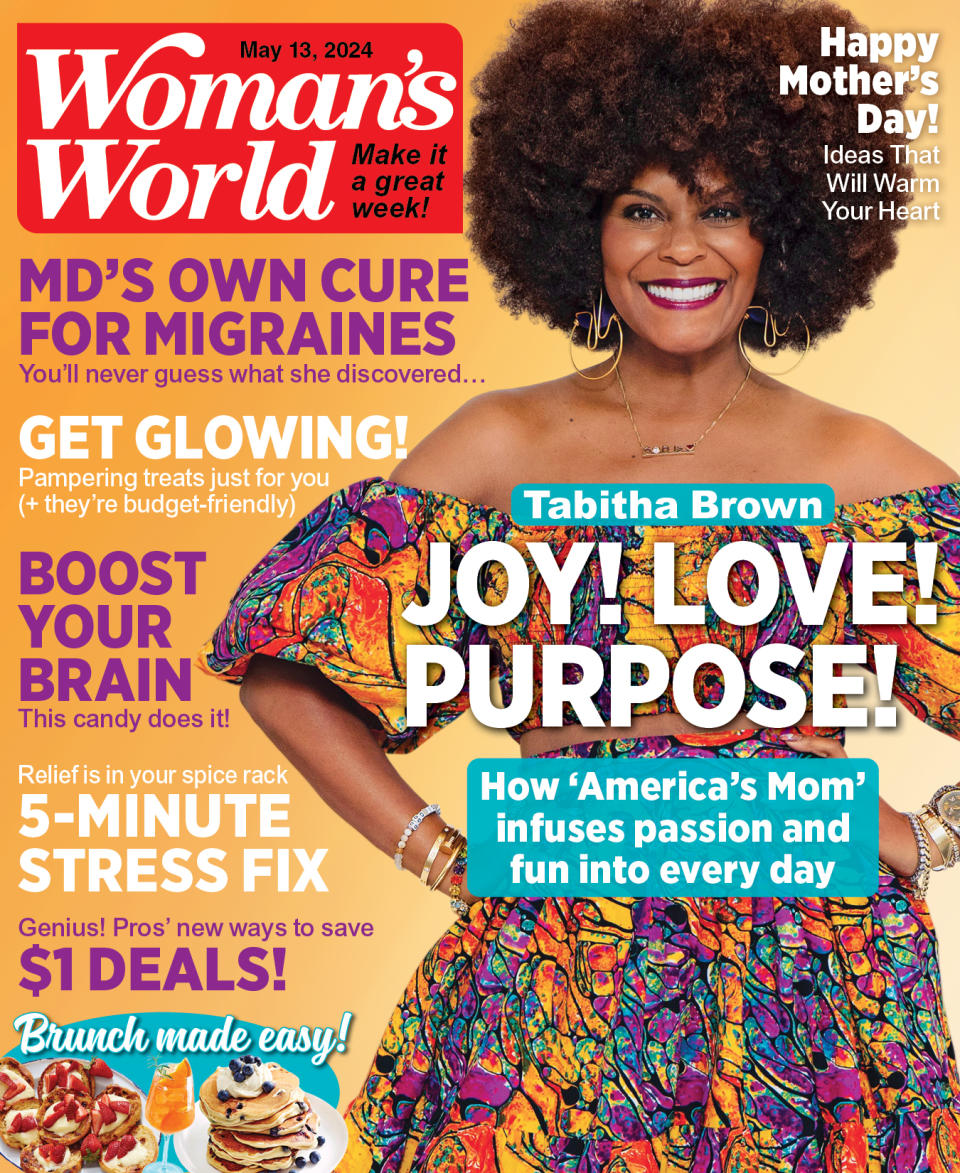
“Back in 2014, I was a new mama at the time, and I just thought, ‘I’m bored. I need to do something to switch it up,’” Tabitha says of the journey that inspired her new book, in which she challenges women to try one new thing every day, even if it’s a simple as changing your hair.
Tabitha’s philosophy has helped her see her dreams come true. After finding viral fame in 2017 for a Whole Foods sandwich review, the South Carolina native now has an Emmy-winning YouTube children’s show, a best-selling memoir and cookbook and a line of seasonings for McCormick. She's also the co-founder of Donna’s Recipe, a haircare line named after her signature afro, which she has playfully nicknamed Donna.
Tabitha Brown shares her advice to other women
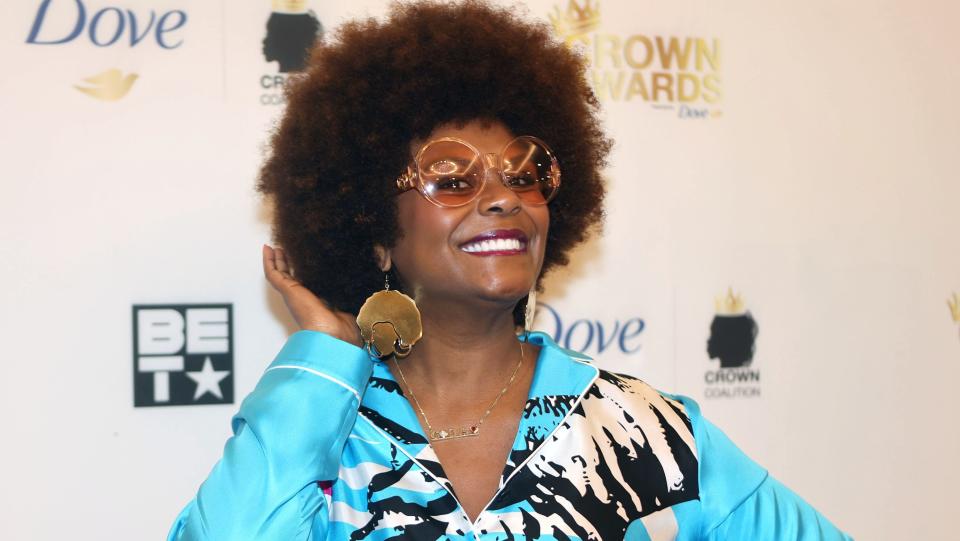
Peter Forest/Getty
Tabitha Brown has amassed over 13 million followers who are drawn to her warm, sunny attitude and inspiring advice.
“I always tell women, I know it’s hard, I know we all have families and jobs and careers and all these responsibilities, but we should be our first responsibility. We are number one,” she says with a smile.
“We’ve got to put ourselves first and what that means is we’ve got to start our day with us. Before the kids get up or before our husbands or our partners or whoever we need to help. We need to make sure we help ourselves first. Make sure we have a little moment of silence for ourselves whether it’s in the shower or whether you pray or meditate. Just have a little moment with yourself first.”
Tabitha Brown talks small moments of self-care
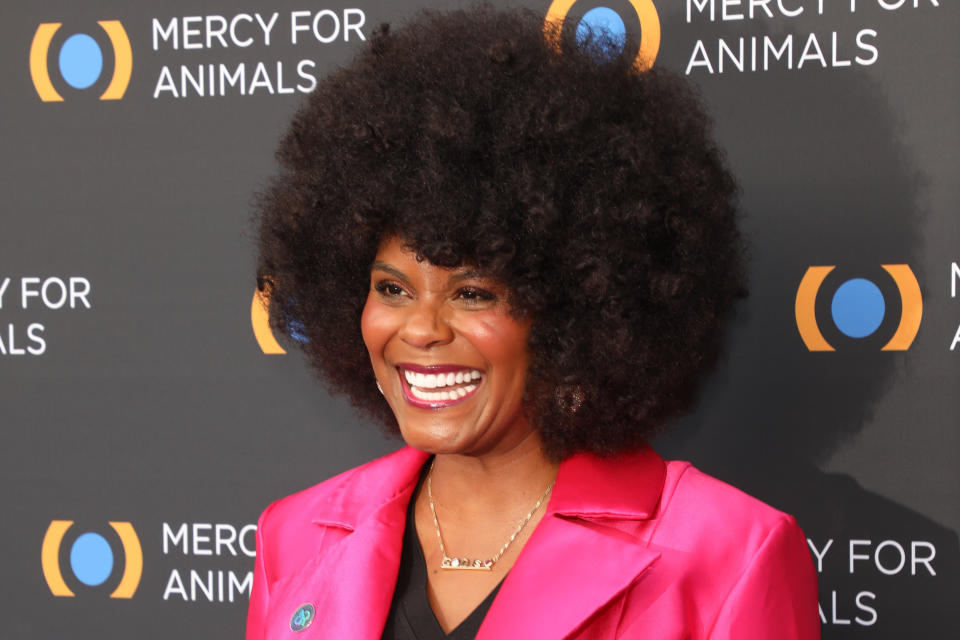
Paul Archuleta/Getty
Another part of Tabitha’s early morning ritual is hydration. “Drink your water when you wake up is another thing I always tell women,” she relates. “I put a bottle of water on my bedside table every night so it’s the first thing I grab in the morning to get everything flowing and it really does set the tone for the morning.”
Exercise and proper nutrition are also key. “I get a little workout in, whether it’s a little cardio or some stretching or some type of movement, I just make sure my body is moving well,” she says.
“And what am I going to put inside my body to start my day? I always like to have something like fresh fruit or fresh vegetables, something to kind of boost my system to say, ‘Okay, invite good things in today.’"

Charley Gallay/Getty for Netflix
“Then throughout your day, make sure you are checking in on yourself,” Tabitha continues. “Sometimes the day can get away from us, so whether it’s a little 10 or 15 minute break that you give yourself to take a walk outside or go sit somewhere quietly or read a book or journal a little bit, whatever you can to pour back into yourself because honey, people are going to pour from us all the time, but we’ve got to also say, ‘You know what? I’ve got to take a little bit of time for me.’”
Letting go of things that no longer serve you
Tabitha also encourages women to learn to let go of the things that aren’t serving them well, even when that means letting go of friendships.
“The most difficult thing I’ve dealt with these last few years is losing relationships or friendships that I thought were permanent that I had to realize were seasonal,” she says.
“In prayer, God spoke to me and said ‘Everybody can’t go with you, Tab.’ It was very hard, especially to let go of some friends I thought would be my friends forever and ever. Once I started to be on what I call my ‘freedom walk’ in these last six-and-a-half years where I stopped living my life like everybody else and I lived the way God really created me to live, I realized that everybody is not ready to choose freedom and my freedom can make other people uncomfortable."

Leon Bennett/Getty
“No love lost,” she continues, “but if they can’t find comfort in that freedom because they’re not ready for theirs, I had to respect that and so as much as it hurt, I had to move on. I had to process that, but what I also realized there’s new people that God sends our way for the next season of our life, and we have to be open to receiving that."
"He has sent me so many new people," Tabitha continues. "I’ve taken it one day at a time. I did a lot of crying because when you lose a friend or a relationship that was near and dear to you for so long, it feels like a death even though nobody died, but you have to allow yourself to mourn that relationship and also mourn the person you were when you were with them because that person is no longer. So I gave myself grace and I gave myself time to do that and I feel like I’m better because of it.”
MUST-READ: How to Be a Better Friend + Make New Ones: Experts Share 6 Ways to Boost Your Bonds
Tabitha reveals lessons from her mother
Much of Tabitha’s wisdom and optimistic attitude were learned from her mother, who even when suffering from ALS found a reason to smile.
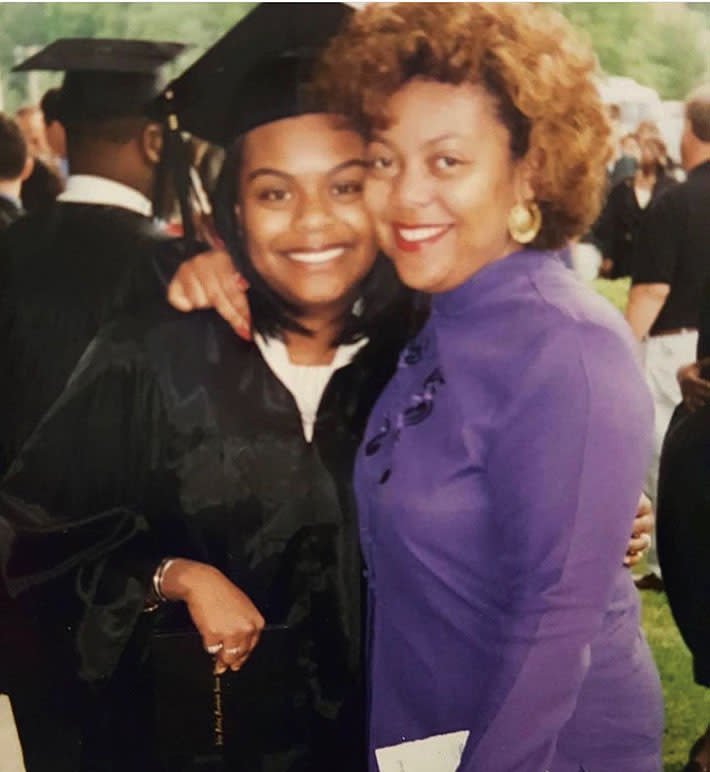
Courtesy of Tabitha Brown
“When my mama was diagnosed, they gave her about eight months to live and thank God, she lived for three years,” Tabitha Brown says of her mom Patricia, who died in 2007.
“She smiled every day that she could, and she never complained... My mama was a social worker. She was also a pastor and being able to give back and being in community was her purpose and passion. You would think losing the ability to do that would make her fall into depression, which a lot of people do, but she still was happy. She still was grateful for the 51 years of life that she had lived. I learned so much from that.”
She also learned how to treat others. “Grace is the best thing that I learned from her,” Tabitha says of her mother.
“Grace, patience and God’s timing. She was such a graceful woman. Another thing she taught me was that everybody has something to offer. So be kind to people. Love people and respect people because we all have something to offer this world and each other. So those are some of the best things that she taught me.”
Tabitha Brown spreads awareness about ALS

Aaron J. Thornton/Getty
Because of her mother’s battle with ALS, Tabitha Brown is passionate about supporting organizations that help those affected by the disease, such as the ALS Association and the Jim “Catfish” Hunter ALS Foundation.
“It’s a non-profit in North Carolina that really blessed us and helped us. I’m always giving back to them,” she says. Tabitha admits most people don’t know much about ALS, which is also called Lou Gehrig’s disease.
“ALS is a neuromuscular disease. It is terminal and is very, very rare so most people don’t even know about it until it hits their family,” she explains.
“The best way for me to describe it is our brain tells our nervous system what to do and there’s a connector. Eventually what happens is that connector is like a motor, and it goes out, so the brain cannot get the message to the nervous system anymore and so eventually our muscles are not getting the message on what to do so they begin to go to sleep. The first thing that happens in the majority of the people who are diagnosed with ALS is it starts in a limb."
“With my mama, it started in her right hand. She started to feel it shake and it would have little muscle twitches. She would go to so many doctors and it’s also very hard to diagnose so they said, ‘Oh it’s carpal tunnel from years of typing’ or ‘It’s stress’ or ‘It’s all in your head.’ Eventually her right hand went to sleep and she was no longer able to move it and eventually it traveled down to the right side of her body to her foot."
"She began to limp because in her right foot, the muscles were starting to go to sleep. She could no longer walk and eventually the only movement that is left are your eyes where you can still blink. You can still hear and see and understand everything that’s going around you, but you are trapped in your body. Ultimately our lungs are muscles and they forget to expand and breathe, so that’s what causes death. It’s a very tortuous disease. Everything goes to sleep. Some people have onset where it starts with their vocal box because that’s a muscle, so you no longer can talk. Thankfully with my mama her vocal box was one of the last things to go.”
Tabitha Brown talks her mother's lasting impact

Aaron J. Thornton/Getty
Seeing her mother battle a terminal illness with grace has had a lasting impact on Tabitha.
“You go from seeing this person who lived this normal life to not being able to open a water bottle, to not being able to feed themselves, to not being able to clothe themselves or walk or talk and it’s such a hard thing to watch, but I also watched my mama go through it with so much grace. She never complained. I learned so much from that experience. We have the gift of life and the gift of movement and the gift of walking and talking. There’s so much to be grateful for and so my heart is always open, and it always goes out to people who are living with terminal diseases or are living with a different ability. I never say disabled. I always say you have a different ability. We all are in this world together, but we all have different struggles.”
Through faith, Tabitha has also learned to be patient and wait on God’s timing.
“For me, faith is believing in something you can’t even see, and I am living in the dreams that I had as a kid,” she says with a smile.
“I could visualize it. I believed it so whole heartedly and I had faith that these things would happen, so I just kept working on it. I’ve been pursuing entertainment for over 20 years, and it took 20 years before things happened the way that it happened. One of my friends said, ‘Imagine in 1998 when you first moved to California to try to pursue your career if God had said, 'Hey listen, I’m going to give you all of the desires of your heart, but I’m going to just need you to give me 25 years to make it happen.' You would have looked at God and said, 'Oh no, I can’t wait 25 years!' In reality, that’s what you did because you didn’t give up and you’ve been pursuing it every day for the last 25-plus years and it happened.'"

Emma McIntyre/Getty
“So sometimes we can’t look at the timing. We just have to look at the day-by-day and just keep going. I’m going to keep having faith. If I’ve got faith the size of a mustard seed, that’s all we need. It could be a very small faith, as long as you’ve got it, you can keep on going. You’ve just got to keep believing and you can live in your dreams.”
To read the rest of Tabitha's interview, pick up the issue of Woman's World on sale this week at your local grocery store, Walmart or online. And don't miss Tabitha's new book I Did a New Thing: 30 Days to Living Free, available everywhere books are sold!
